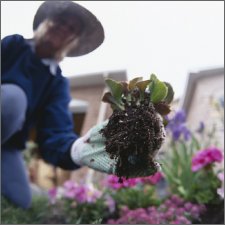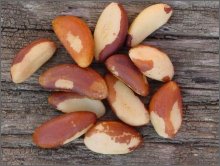To Fight Osteoarthritis & Multiple Other Chronic Diseases, Make Sure You Get Enough Selenium
by www.SixWise.com
Selenium, a trace mineral that is essential to health, is
emerging as a nutrition powerhouse -- yet few people are aware
of its importance, or where to get it.
|

The selenium level of the soil where your food is grown
greatly affects its selenium content.
|
Most recently, a study by researchers at the University of
North Carolina (UNC) at Chapel Hill Thurston Arthritis Center
found that low levels of selenium are linked to knee osteoarthritis,
the most common type of arthritis. The study, which began
15 years ago and involves 940 people, found:
-
For every additional tenth of a part per million of
selenium, participants' risk of knee osteoarthritis decreased
15-20 percent.
-
Those with lower-than-normal levels of selenium in
their systems had a higher risk of the condition in one
or both knees.
-
The severity of participants' arthritis was related
to how low their selenium levels were.
"We are very excited about these findings because no
one had ever measured body selenium in this way in relationship
to osteoarthritis," said study leader Dr. Joanne Jordan
of UNC.
"Our results suggest that we
might be able to prevent or delay osteoarthritis of the
knees and possibly other joints in some people if they are
not getting enough selenium. That's important because
the condition, which makes walking painful, is the leading
cause of activity limitation among adults in developed countries,"
Jordan said.
Selenium: An Antioxidant Powerhouse Against Disease
When you consume selenium, it's incorporated into proteins
to make selenoproteins -- potent antioxidant enzymes that
help prevent cellular damage from free radicals.
Selenoproteins also help regulate thyroid function and the
immune system, according to the National Institutes of Health
Office of Dietary Supplements (ODS). It is also known to be
protective against a host of chronic diseases, aside from
osteoarthritis.
Cancer: Selenium is thought to protect against cancer
through its antioxidant content. It also may slow or prevent
tumor growth by enhancing the immune system and suppressing
blood vessels to the tumor. Studies on the topic have yielded
interesting results:
-
Death from lung, colorectal and
prostate cancers is lower among people with higher levels/intake
of selenium.
-
Nonmelanoma skin cancer occurs more frequently in areas
of the United States that have little selenium in their
soil.
-
In a 1983-1990 study, those taking a daily selenium supplement
had a significantly lower rate of prostate, colorectal,
lung and total cancers than those who did not.
Heart disease: As noted by the ODS, a lower antioxidant
intake has been linked with a greater incidence of heart disease.
Further, selenium may limit the oxidation of bad (LDL)
cholesterol, which may help prevent coronary artery disease.
HIV: Antioxidant nutrients like selenium may help
slow the progression of HIV/AIDS. A deficiency of the nutrient
is also linked to decreased immune cell counts, increased
disease progression and a high risk of death among people
with HIV/AIDS.
Cognitive decline: Low levels of selenium have been
linked to cognitive decline and Alzheimer's disease in the
elderly.
Cataracts and macular degeneration: Selenium's antioxidant
activity fights free radicals that may damage the eye's lens
and macula at the center of the retina. This may help prevent
cataracts and macular degeneration, which are the two most
common causes of blindness in elderly Americans.
Cold sores and shingles: Cold sores and shingles that
erupt from the herpes virus may be suppressed by selenium
because it boosts the immune system. One study published in
Agriculture Research also found that mice with low levels
of selenium were particularly susceptible to herpes virus
outbreaks.
|

Want an easy way to eat more selenium? One Brazil nut
contains almost twice the RDA!
|
The Best Ways to Increase Your Selenium Intake
"If you were just growing most of your own food in soil
that did not have much selenium and not eating vegetables
and meat from elsewhere, you could potentially get in trouble
with selenium deficiency," Jordan said. That's because
the selenium content of your food is highly dependent on the
level of selenium in the soil where the food was grown.
In the United States, for instance, soil
in northern Nebraska and the Dakotas have very high levels
of selenium. So high, in fact, that people living in
these areas typically have the highest selenium intakes in
the country, says the ODS.
Soil in certain areas of China and Russia, on the other hand,
are known to contain very low levels of the mineral, and deficiency
is often reported in these regions.
Since most people in the United States generally eat food
from a variety of regions, low soil levels of selenium usually
don't present a problem. Still, there are certain foods to
focus on if you want to be sure you have enough selenium in
your system. Try snacking on:
- Brazil nuts
(one nut contains 120 mcg, about twice the Recommended Daily
Allowance)
- Tuna, cod and flounder
- Oysters and shrimp
- Chicken and turkey
- Beef
- Oats
- Brown rice
- Eggs
- Wheat germ
- Sunflower seeds
The best way to get selenium is from foods, as it is possible
to overdose on this nutrient.
High blood levels of selenium can result in selenosis, a
condition that results in mild nerve damage, gastrointestinal
upset, hair loss, fatigue, irritability, white blotchy nails
and a garlic odor on the breath. The most selenium an adult
should get in a day is 400 micrograms, according to the
Institute of Medicine's tolerable upper intake level.
Recommended Reading
Magnesium:
Why Your Heart is Begging You for More of This Essential Nutrient
How
to Prevent Alzheimer's: The Most Effective Ways to Avoid this
Rapidly Increasing Disease
Sources
Eurek
Alert November 13, 2005
Office
of Dietary Supplements: Selenium
Whole
Health MD: Selenium